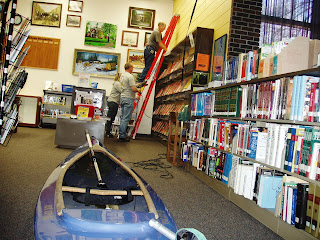A lot of people get the idea that libraries are just places where books come in and go out and questions are answered, perhaps not sensing that there is a whole world of activity--financial, legal and technical--going on in the parts of the library where the public can't see.
Like what, you ask?
CataloguingA book or DVD or CD comes in (after being selected and ordered) and it's like a newborn babe: nude and unsullied. So how does the public find it? We can't just throw it in a big box and wish our users luck, can we? No. First, it has to be covered to protect from sweaty hands and cigarette ashes and syrup. Then we have to mark it so other libraries who use it know where it needs to go when they are done with it. Then, it needs to get a call number and label and barcode. But which call number? Is a book about Lance Armstrong kicking rear in the
Tour de France a biography or a book about cycling? Sometimes that work has been done elsewhere and we can just plug it into our computers...but sometimes we have to figure it out ourselves, and it can take a while.
CirculationOkay. The book is covered and catalogued and is ready for some eager reader. Well, then it has to be shelved--and correctly--or it might as well be lost. Shelving and shelf care is a bigger job than it sounds, and anyone who might scoff at that idea is welcome to volunteer to do it! We could use you! Next, when someone pulls an item down, it has to be checked out. The user's card account has to be checked for fines and overdues and the item has to be scanned and de-magnetized, lest the security system embarrass our user at the door. Oh! And don't forget collecting fines and fees and keeping track of the money!
And don't forget that all the books coming back to us have to be checked in and put away. Now, none of this is an "every few minutes" kind of thing. These are constant processes, going on from open to close and beyond.
Reference and Interlibrary LoanUh-oh. A user can't find the book he so desperately wants to read! What now? The reference and interlibrary loan specialists spring into action. They know how to get books for locals from far away and exotic places like Rice Lake and Milwaukee! Now and then, a book can only be found across state lines. Reference and interlibrary loan folks know how to make it happen.
Or maybe a user just wants to know the answer to some trivia question that came up at the Tomahawk Room the night before...maybe the next day he's still wondering which baseball hall of famer (who wasn't a pitcher) has the lowest batting average. You can ask at the reference desk, and they'll tell you all about Ray Schalk.
Business and AcquisitionsBut how does all this keep going? Someone has to keep tabs on the budget, the expenditures, the building maintenance, the income from fines, fees, copies. What about the copy paper? Is there enough? Somebody has to be watching the taxpayer's money, right?
And what about all the stuff the library offers...? It has to be selected and purchased. What about the policies that help us decide WHAT to buy and offer? Well, the library board has to think about and discuss many issues to keep the place running
clean and legal.So the next time you walk in the library and look around, it may seem calm...but there is more going on than you might see.
Think about it.



